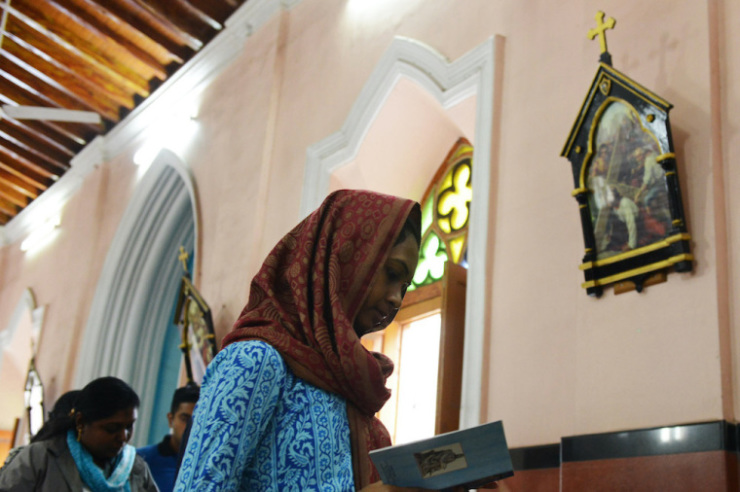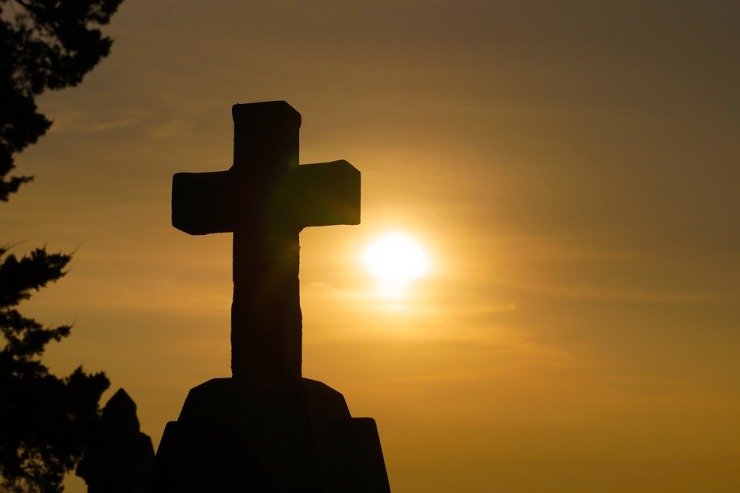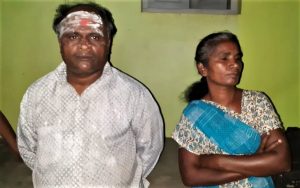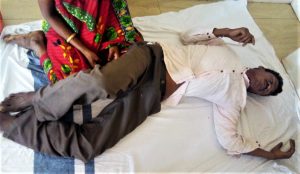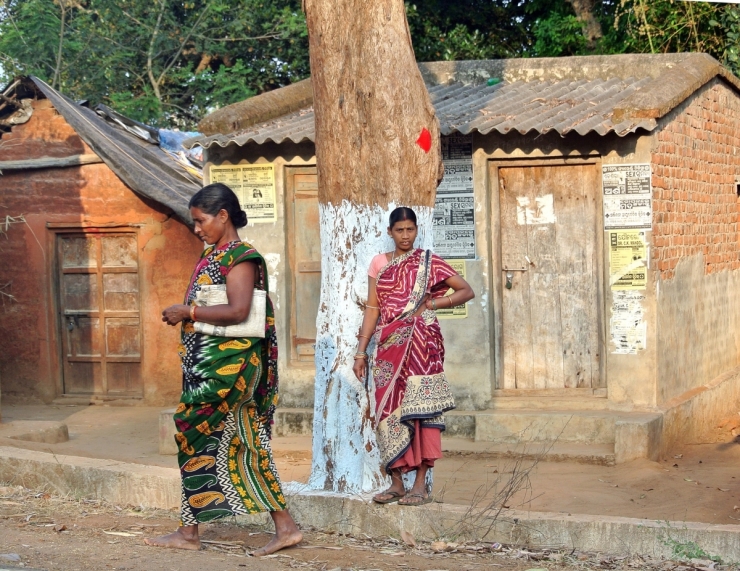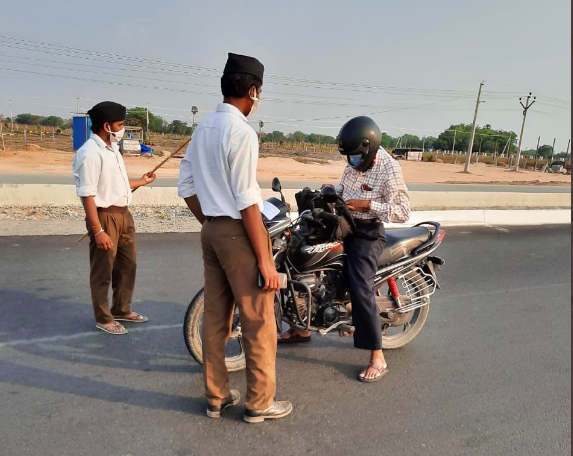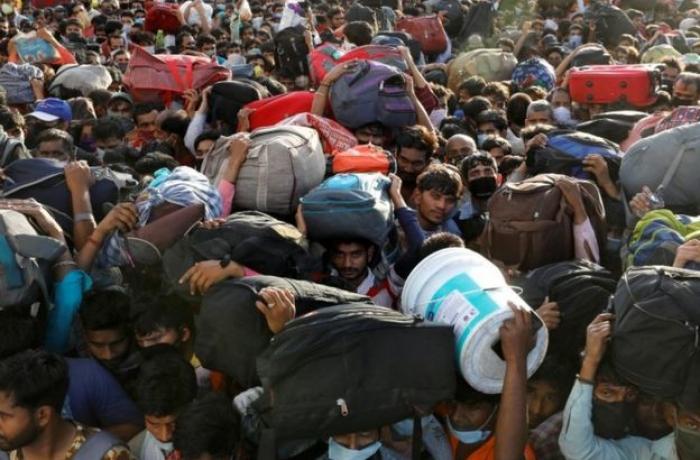Hindu leader threatens Christians with new wave of persecution
Indian Catholic devotees offer the way of the cross prayers after an Ash Wednesday service at Saint Mary's Basilica in Secunderabad, the twin city of Hyderabad, on March 5, 2014. AFP via Getty Images/Noah Seelam The chief of a Hindu nationalist group has launched a nationwide campaign against "forcible" conversions to Christianity. In a media interview, Milind Parande, the General Secretary of the Vishwa Hindu Parishad, or World Hindu Council, claimed that Hindus were being forced to convert to Christianity and Islam. "They (Christian missionaries) are destroying the ancient culture and indigenous religion of the tribals (aborigines)," Parande told the Times of India. "They are resorting to trafficking of their children. The VHP will not allow this heinous conspiracy to succeed." "Issues like love jihad, where Hindu girls are lured to marry Muslims, are also being brought back. Every year, we bring back at least 2,000 people who have got converted." Several Indian states have had draconian "anti-conversion" laws, termed as Freedom of Religion Acts, for decades but no Christian has been convicted of "forcibly" converting anyone to Christianity. Most attacks on Christians are launched under the pretext of the alleged "forcible" conversion of Hindus. According to India's own population data, the conspiracy of mass conversions to Christianity does
Coronavirus Exposes India’s Official Callousness
The government should have anticipated how a nationwide lockdown would impact the urban poor. The largest lockdown in history is not, to put it mildly, going as planned. Within a few days of Indian Prime Minister Narendra Modi announcing on national television that the country was being shut down for three weeks, hundreds of thousands took to the country’s highways, marching long distances back to their home towns and villages. Others thronged bus stations—the trains are not running—hoping for a bus back home. At least 22 people have reportedly died in the mass migration, exhausted and hungry. The point of India’s lockdown, as elsewhere, is to prevent transmission of the novel coronavirus. But, if anything, this vast movement of people likely means the virus will find its way to the poorer rural parts of India where it could do the most damage. There’s certainly little social distancing in evidence in the photos of thousands of people jostling each other waiting for buses. All this could—and should—have been avoided. There was no need for the government in Delhi not to prepare citizens for what a lockdown would entail. Nor was the government itself anywhere near prepared for what the crisis would ask of its own
STATEMENT: FIACONA is Concerned About the Distribution of Much Needed Supplies to Vulnerable Sections of the Population During the Lockdown.
Washington, DC April 1, 2020 The Federation of Indian American Christian Organizations (FIACONA) is pleased to learn that 2.9 million dollars is allocated for India to fight the Coronavirus issue in the stimulus package. However, due to the complete lockdown of the country, all private traders and grocers in India had to shut down their shops and outlets leaving the public at large with no options to buy even vegetables from anywhere, for their day to day survival. The Indian government wants to take the sole responsibility of distributing all vegetables and groceries for each family in the whole country for the remaining 2 weeks of the 21-day lockdown or until the lockdown is lifted. Mr. Koshy George, the President of FIACONA in a letter to President Trump said, "It is an effort that was never tried at this scale before. The entire population of 1.3 billion people will need such deliveries when they run out of basic groceries soon if they have not already run out". He further said, "We doubt the government has the manpower to achieve this task on its own. We see that the failure of the government to plan properly ahead of this kneejerk reaction to SARS-CoV-2 has made a
Coronavirus: Indian Church urged to care for stranded migrants
Catholic bishops of Ranchi, eastern India, have appealed their fellow prelates to reach out to millions of migrant laborers stranded in the country by the 21-day national lockdown. “These are difficult times and even as we live in lockdown and make every attempt to keep ourselves safe, thousands of migrants are stuck where they are, not knowing where to go or have hit the road with their families and children without transport, monetary means or alimentary provisions,” says the March 28 appeal from Jesuit Archbishop Felix Toppo of Ranchi and Auxiliary Bishop Theodore Mascarenhas. Indian Prime Minister Narendra Modi at 8 pm on March 24 ordered the nationwide lockdown from the midnight of that day as way to prevent spread of the Covid-19. It limits the movement of the country’s 1.37 billion people for 21 days. The lockdown was preceded by a 14-hour voluntary public curfew on March 22. India_MattersIndia-Archbishop Felix Toppo The lockdown has caught millions of migrants and daily wagers off guard, leaving them no time to return home. Hundreds of thousands of them are now seen stranded at bus or railway stations or walking to their villages hundreds of kilometers away. The bishops of Ranchi, who made the appeal a day after Pope
Police Detain Christians Providing Aid to the Poor in Tamil Nadu, India
Police in southern India’s Tamil Nadu state rushed to a slum where Christians were providing food and other aid earlier this month and detained them on false charges of forcible conversion, sources said. Marakkanam police in Viluppuram District humiliated the Christians, including the presbyter of the Viluppuram Church of South India, accusing them in coarse language of trying to fraudulently convert the poor in the guise of providing basic necessities, said the church’s pastor, the Rev. Perumal Kanagaraj. Shortly after Pastor Kanagaraj and about 30 young adults from the church arrived from Viluppuram to the nearby slum area of Anumandai village on March 8, a member of the Hindu Munnani extremist group showed up and began uttering obscenities at them, the church leader said. “The Hindu Munnani activist soon lost his cool and started beating the youth missionaries while he continued abusing them in extremely foul language,” Pastor Kanagaraj said. “Within no time the crowd started gathering, and he held us up there and was not letting us move.” When the Christians began to call police, the Hindu nationalist told them he had already filed a police complaint against them, and that he would put them behind bars at any cost, he said. “We told
Christian group feeds poor people in Delhi
By Matters India Reporter New Delhi, April 4, 2020: A Christian group has been distributing home-cooked food and rations to people in need in different parts of Delhi since March 25. Unity in Christ, a registered NGO, is led by Minakshi Singh, chairperson, who spearheads the efforts to feed people who affected by the 21-day lockdown due to COVID-19 in India. “We are making food for distribution for poor people. We have also decided to give raw food packets and homemade food in optional days as long as this lockdown lasts, Singh told Matters India. “We intend to render service to people in need during these difficult times. They need our support. Our efforts are all being done by donations of different religious people, of goodwill and walk of life for this noble cause,” Singh said. In the beginning, the number was about 50 people. Gradually the number on the increase as much as 400 people, she informed. Other team members are Sanjay McGee, Dipika McGee, Noel Shashi, Tina Paul and Noel Shashi and a few others from different faith groups. It has been seven days of food distribution in Cluster Loni Gaziabad and other areas. “We do not want appreciation, but a generous heart. We want your
Christian Beaten into Coma by Tribal Animists in Odisha State, India
A young mother and her two children were staring at her husband as he lay unconscious after a mob of 60 villagers in eastern India had stormed their home and beaten him with wooden sticks. “The children and I tried to wake him up – we thought he had fainted – but there was no response,” Bhimeshwari Sodi told Morning Star News. “We cried out for help, but there was nobody to help us. The neighbors said that he was dead.” The animist mob, worshippers of the gods of their tribal religion, beat 30-year-old Kama Sodi unconscious in Odisha state’s Kodalmetla village, Malkangiri District on the morning of March 12, she said. They had first attacked him the night before, surrounding his house as he, his wife and children were praying as they would before bed, Bhimeshwari Sodi said. Before the attack that night, the hard-line animists had shouted at the family that they would kill them, she said. Animist villagers threw belongings of Sodi family out of their home in Odisha state, India. (Morning Star News) “I was able to protect my two small children from their beatings, but my husband was in their clutches,” the 26-year-old Sodi said. “They were beating him very
Unwilling to recant her faith, Christian woman leaves husband and family in Odisha
A Christian woman in Odisha leaves house and family after facing brutal treatment from her husband for following Christianity. Kasturi from Tumhara village started following Christ in 2019 because she found a sense of peace when the church community carried her daily burdens. However, the decision to follow Christianity came with a coast for Kasturi. From the day she was baptized, her husband started to curse her and verbally abuse her. There were times when her husband would kick her out of the house. She would find shelter at her cousin's place and later return home to care for her children. On January 19, 2020, when her husband was not at home, Kasturi went to attend a Sunday worship service. For her surprise, when she returned, her husband was already back. He greeted her with a brutal beating. He told her to recant her Christian faith otherwise she would never be allowed to step out of the house. Kasturi was not willing to give up the faith that brought her a sense of peace, and she decided to leave. "Although I left my house and family, I am still at peace in Jesus Christ," Kasturi told International Christian Concern. "Now, I can go to church every Sunday
Telangana: Inspector Suspended, Police Says RSS Workers at Checkposts Had No Permission
RSS workers were also given official permission to manage rice distribution at PDS shops in the state's Kamareddy district. As photographs on social media showing RSS workers manning a police check post in Telangana triggered a row, officials on Sunday said no permission was given to the volunteers and they were told to leave the place. The police inspector in charge of the check post, has since been shifted and attached to the headquarters, police said adding no case had been registered over the incident. Indian Express has quoted Rachakonda police commissioner Mahesh Bhagwat as having said, “This is the job of the police and we can do it. No permission has been given [to the RSS workers].” The RSS, on its part, dismissed as ‘false’ the reports about its members checking ID cards at checkposts and said these were motivated by “narrow and vested interests”. RSS volunteers helping the police department daily for 12 hours at Yadadri Bhuvanagiri district checkpost, Telangana. #RSSinAction pic.twitter.com/WjE2pcgpSy— Friends of RSS (@friendsofrss) April 9, 2020 Photographs circulated on social media purportedly showed RSS swayamsevaks manning a police check post on a highway in Yadadri Bhongir district during the ongoing coronavirus lockdown with several netizens raising objections. They sought to know how RSS activists “carrying lathis”
Quarantine India, the tragedy of hundreds of millions of poor. Aid from dioceses
Millions of people made unemployed, return to their villages of origin. Premier Modi apologizes for the difficulties caused by the total blockade. Parishes, dioceses and Christian associations assist migrants, Dalits and refugees. Priest: "They call them 'rat eaters'. Our help is a blessing”. Mumbai (AsiaNews) - Dioceses all over India are rushing to respond to the tragedy of the poor, who suffer most from the quarantine imposed across the country to contain the coronavirus infection. Speaking to AsiaNews, Msgr. Felix Machado, archbishop of Vasai and secretary general of the Indian Episcopal Conference (CBCI), declares: “Over the years, the intensive and extensive network of our Small Christian Communities are serving people. Our Unit leaders all over India, know the details of the people living in their zones. We also refer to them as Basic Human Communities, as not one is excluded". The fragile conditions of the poor are causing a humanitarian crisis. The blockade of the country has left millions of people unemployed in the big cities, mostly economic migrants who flocked to cities from rural areas in search of better conditions. The little they earn they send home to families left behind in the villages. Migrants like Goutam Lal Meena, who earns 400 rupees a day in Gujarat (4.8 euros). Having lost





